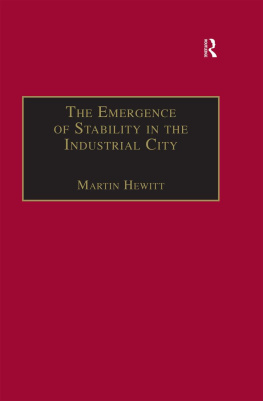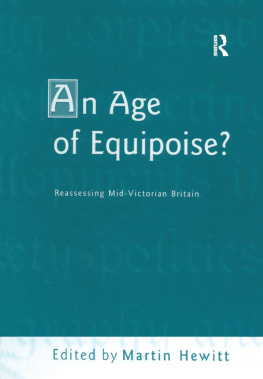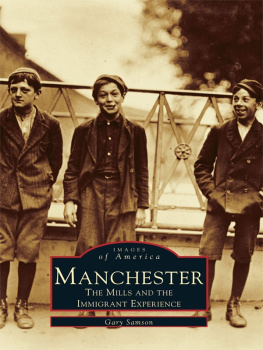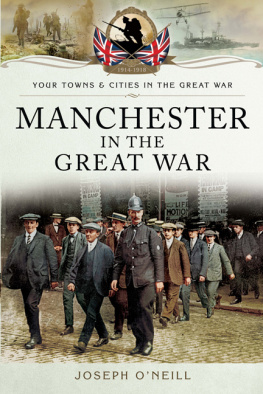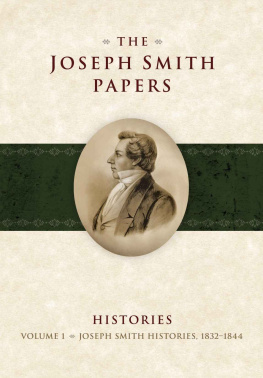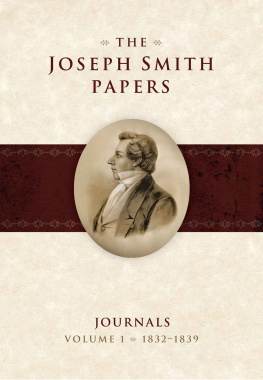First published 1996 by Ashgate Publishing
Published 2016 by Routledge
2 Park Square, Milton Park, Abingdon, Oxon 0X14 4RN
711 Third Avenue, New York, NY 10017, USA
Routledge is an imprint of the Taylor & Francis Group, an informa business
Copyright Martin Hewitt, 1996
All rights reserved. No part of this book may be reprinted or reproduced or utilised in any form or by any electronic, mechanical, or other means, now known or hereafter invented, including photocopying and recording, or in any information storage or retrieval system, without permission in writing from the publishers.
Notice:
Product or corporate names may be trademarks or registered trademarks, and are used only for identification and explanation without intent to infringe.
Transferred to Digital Printing 2011
British Library Cataloguing in Publication Data
Hewitt, Martin
The emergence of stability in the industrial city: Manchester, 1832-67
1. Manchester (England)History 19th century
2. Manchester (England)social conditions
I.Title
942.73081
Library of Congress cataloging-in-Publication Data
Hewitt, Martin
The emergence of stability in the industrial city: Manchester, 1832-67/Martin Hewitt
p. cm.
Includes bibliographical references and index.
1. Manchester (England)Social conditions. 2. Manchester
(England)Politics and government. 3. IndustriesEngland
ManchesterHistory19th century. 4. Working classEngland
ManchesterHistory19th century. I. Title.
HN398.M27H48 1996
306.0942733-dc20
9547155
CTP
ISBN 9781859282762 (hbk)
When I commenced work on this study a decade ago, the years it covers were paradoxically the subject of what amounted almost to scholarly overkill conjoined with academic neglect. The study of chartism was still being driven to new insights by the work of Dorothy Thompson, Gareth Stedman Jones, and their students and fellow travellers. At the same time, the post-chartist period, notwithstanding a spate of work on the labour aristocracy, languished in neglect. Even when the thesis, of which this book is a revision, was submitted in 1991, it was necessary to go back to Frances Gillespies Labor and Politics in Britain, 1848-67, (1927) to find a detailed appraisal of the post-chartist period. Although there was no shortage of books which purported to cover 1848-67, this period was largely unoccupied ground, over which historians of the early nineteenth century and of the later nineteenth century fought for rights of annexation.
This situation is rapidly changing. Recent years have seen a spate of new studies of both the period and the problem addressed in this study, most notably Eugenio Biaginis Liberty, Retrenchment and Reform, (1992), Margot Finns After Chartism, (1993), James Vernons Politics and the People, (1993), and Miles Taylors The Decline of British Radicalism (1995). All, in their various ways, have addressed one of the central questions of British nineteenth century history, and indeed of the history of all industrialising societies, namely the roots of the transition, apparently almost revolutionary in its pace and absoluteness in Britain, from the decades of social instability of the early industrial revolution, to the social and political stability of the maturing industrial economy.
We are thus suddenly much better placed than we have ever been to unravel the conundrum of the collapse of chartism and radicalism, and to explain the evolution of social and political forms which in Britain appeared to preclude the maintenance of radical challenges to the status quo, choked the growth of Marxism or socialism, and buttressed the power of traditional elites. And yet, on examining this scholarship what is most striking is the absence of any new explanatory consensus, any new theoretical construction, that might provide a new orthodoxy to settle, at least for the time being, the question which has so vexed scholars since E.P. Thompsons discovery of a class-conscious working class in the early nineteenth century created the historical whodunnit of this classs sudden and tragic disappearance. There has been some attempt in the past few years to side-step this question, by suggesting that class never became the central paradigm of social identity in nineteenth century Britain. However, in chapter one I endeavour to show why I remain unconvinced by the arguments of the linguistic turn.
Instead, this study attempts to work within the broad confines of Thompsonian culturalism, while adopting lines of inquiry which reveal considerable sympathy with the questions and subject matter of the scholars of the linguistic turn. Chapters two and three discuss the development of Manchester during the mid-nineteenth century, establishing the foundations of working-class identity and of middle-class reformism. Chapters four, five and six then examine the struggle to shape the intellectual cultures of the working class, arguing that despite the overt aims of embourgeoisiement or intellectual hegemony, there is little evidence that the middle class was able successfully to construct mechanisms which might explain a collapse of class consciousness. Chapters seven, eight and nine proceed to examine the nature of working-class consciousness and politics in the light of these conclusions. They argue that there are marked continuities of attitude and belief among the working classes across the chartist and post-chartist period, but that a clear shift can be detected in working-class perceptions of the efficacy of the traditional tactics of platform radicalism. This shift, which accurately reflected the more difficult terrain of political culture in the 1840s and 1850s, helps explain the collapse of chartism and the weakness of its successors, but it amounts to no more than a strategic reorientation of working-class political aspirations, and the operational difficulties caused by this reorientation.
During the course of writing this book (and before that the thesis on which it substantially draws), I have accumulated numerous debts. The Economic and Social Research Council provided me with two years of funding, and Nuffield College, Oxford generously supplemented this with a third, as well as providing a host of benefits during the four years I was attached to the College. I have received guidance and encouragement particularly from Asa Briggs, Chelly Halsey, Tony Howe, Neville Kirk, Maxine Berg, Keith Nield, Mike Turner, Robin Pearson, Douglas Reid, David Richardson and Christine Hallas, as well as useful comments from seminars in Oxford, Hull and Manchester. I have also benefited from the guidance and assistance of the staff of various libraries and archives, particularly the Manchester Central Library.
Over the years my parents have helped both spiritually and practically in countless ways. Above all, however, this book finally sees the light of day as a result of the constant encouragement and monumental patience of Mary-Clare. I hope I have done her justice.
Menston
1995

